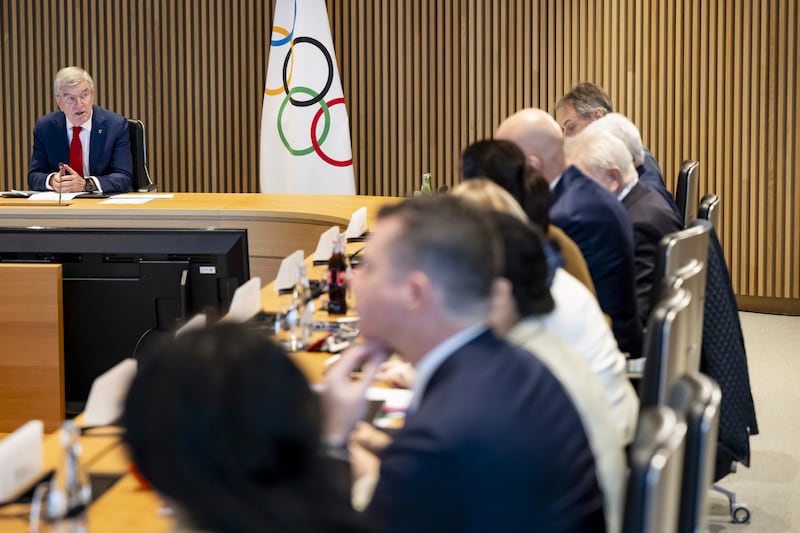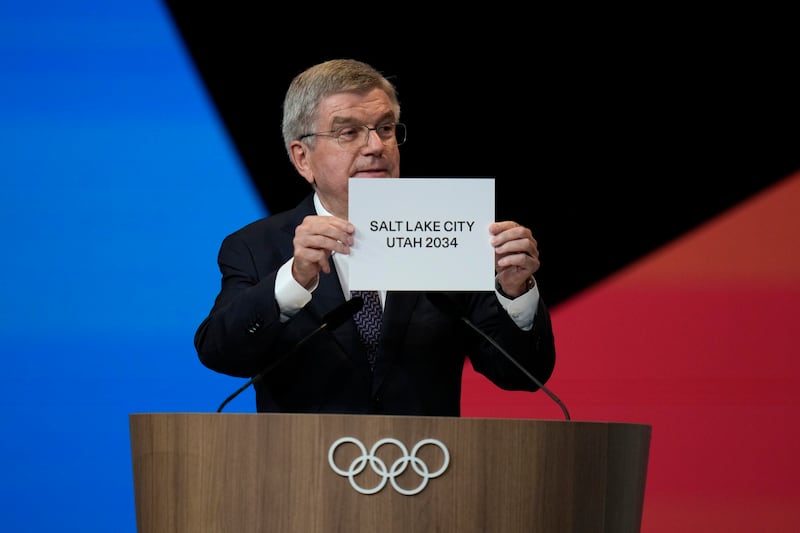Utahns likely know outgoing International Olympic Committee President Thomas Bach as the official who announced last year the state was getting another Winter Games with the words, “Salt Lake City Utah 2034.″
That wasn’t the only big decision out of Paris. Before the 2024 Summer Games there ended, Bach, 71, declared he would not seek another term as president of the Switzerland-based IOC when his 12 years in office ends this June.
That sparked a scramble for the world’s top Olympic post, with seven members of the IOC jumping into what started as a wide-open race that will be decided by a secret ballot of their peers on Thursday.
The IOC members running to replace Bach are:
- Prince Feisal Al Hussein, Jordan, IOC Executive Board member.
- David Lappartient, France, international cycling federation president.
- Johan Eliasch, Great Britain, international ski and snowboard federation president.
- Juan Antonio Samaranch Jr., Spain, an IOC vice president, son of a former IOC president.
- Kirsty Coventry, Zimbabwe, IOC Executive Board member, Zimbabwe minister of sport.
- Sebastian Coe, Great Britain, international track and field federation president.
- Morinari Watanabe, Japan, international gymnastics federation president.
Coe, Coventry and Samaranch are viewed as the frontrunners going into the vote by around 90 IOC members, but Olympic observers say the outcome is difficult to predict after a low-key campaign conducted almost entirely out of the public eye.
Utah’s Olympic organizers don’t have a favorite candidate, said Fraser Bullock, president and executive chair of the 2034 Winter Games organizing committee board. He’s in Greece for the election, being held during several days of IOC meetings at a remote luxury resort near Olympia, the site of the ancient Olympic Games.
“Whoever it is, we’ll be 100% on board,” said Bullock, who is well-known in Olympic circles after serving as the chief operating officer of Utah’s last Winter Games, in 2002, and leading the bid to bring them back.
“I know some of the candidates fairly well,” he said, declining to name names. “But I think the ability we have in Utah is we can work with anybody. We just have a style that is built around partnership and collaboration.”
Rich Perelman, founder and editor of The Sports Examiner in California, said when it comes to Utah’s next Olympics, he doesn’t see any “significant difference” between who he and others are calling the three leading candidates, Coe, Coventry and Samaranch.
He said Coe, 68, would be a “magnetic” yet “polarizing” leader due to his strong opinions but would have a “very, very strong good working relationship” with U.S. Olympic organizers after heading up the 2012 Summer Games in London.
Coventry, 41, believed to be Bach’s choice, would be the first woman president of the IOC. But Perelman said she’s seen by some as too young and inexperienced on the international stage to deal with world leaders like Trump and Russian President Vladimir Putin.
Samaranch, 65, whose late father presided over the selection of Salt Lake City as the 2002 host, was educated and does financial work in the U.S. An IOC member since 2001, he is a candidate “everybody feels they can get along with and work with,” Perelman said.
It’s likely to be a tight race, he predicted, citing Lappartient and Prince Fiesal as potential wild cards.
Trump and transgender athletes in the Olympics
The campaign to lead the IOC, at least publicly, “has nothing to do with Salt Lake in 2034,” Perelman said. But the self-described lifelong Republican suggested that focus could shift because of President Donald Trump’s attention-getting approach to international relations.
“I don’t think we know what the issues are going to be. There are going to be issues,” he said. “I don’t think it’s as much an issue with Utah, but what is the world going to look like post-Trump? Because he is changing the paradigm.”
The president has already called on the IOC to ban transgender athletes from the Olympics, rather than leaving eligibility determinations up to international sports federations as part of his “Keeping Men out of Women’s Sports” executive order.
That order spells out that the United States will “to the extent permitted by law,” prevent transgender athletes from entering the country for competitions, a declaration that would affect American Olympics, including the 2028 Summer Games in Los Angeles
But Bach recently dismissed a letter from GOP members of Congress demanding the Olympics “base eligibility for women’s athletic competitions on biological sex” as the result of “a fake news campaign started in Russia.”

He accused Russia of creating the controversy about the gender of women’s boxing medalists at the Paris Games because the IOC withdrew recognition from the Russian-led International Boxing Association. A new boxing federation is expected to be recognized by the IOC this week.
The IOC position on participation by transgender athletes could change under a new president.
Coe has backed Trump’s position and other candidates, including Coventry and Samaranch, also see a need to revisit the IOC policy adopted in 2021 “to protect the women’s category” in competition, Perelman said.
“The question isn’t, ‘What does Trump think?’ It’s something that’s already happening in the Olympic movement,” Perelman said.
Canadian Robert Livingstone, the producer of GamesBids.com, also expects to see movement on the IOC’s transgender policy.
“It’s one of the most complicated issues, I think, the IOC has faced in years,” Livingstone said, adding the IOC’s larger emphasis on diversity, equity and inclusion under Bach is also likely to be overhauled.
“As soon as a new president is elected, everything is going to change,” he said. IOC presidents are elected to an eight-year term and can run again for another, four-year term. That means whoever is elected Thursday may well be in office when 2034 rolls around.
Would a new IOC president impact the 2034 Games?
Still, Livingstone said a new leader shouldn’t have a dramatic effect on Utah’s next Games.
“We’ll see what happens with the U.S. relations with the IOC, if that’s going to cause a problem,“ he said. ”I don’t know where that could go. But I don’t see that this new president — any of those choices — will have a huge impact on Salt Lake City.”
Especially since so much is in place now for 2034, including venues from 2002 that will be reused.

“There’s not much play there, and I can’t imagine any new president really wanting to disrupt what’s there,” Livingstone said, adding, Utah’s plans are “pretty much in stone ... there’s not a lot of wiggle room and there’s no reason to change anything. That’s extremely unique.”
Perelman said it’s too soon to say what could affect the Utah Games under a new IOC president.
But, he said, “Salt Lake is seen as an absolute safe haven,” thanks to the experience Bullock and others are bringing from 2002, widely considered to be one of the best-ever Winter Games. “Nobody, nobody is worried about Salt Lake.”
Last week, one of the few big issues the IOC needed to resolve for Utah was handled. A $3 billion deal with Comcast NBCUniversal extends the multiplatform company’s U.S. media rights to Utah’s 2034 Games and the 2036 Summer Games, whose host has yet to be named.
Bullock stressed that Utah’s organizing committee “will fully embrace the new president and look to quickly build a partnership with him or her, similar to the partnership we’ve had with President Bach.”
Bach has been in Utah’s corner since he headed up the IOC Evaluation Commission in 1994, Bullock said. The commission was responsible for narrowing the number of cities bidding for the 2002 Winter Games, under the old bid process that was later replaced under his presidency.
Last fall, Bach made his first trip to Utah since 2002, taking the time to meet with young athletes at the Utah Olympic Oval and other venues as well to encourage state and local leaders to “think big” as they prepare to welcome the world again.
What Bach says the IOC’s next leader needs to do
Speaking to reporters after Monday’s IOC Executive Board meeting, Bach had this advice for his successor: “Keep the unity of the Olympic movement. Unity does not mean that everybody must have the same opinion but unity means that all are committed to the same values.”
To make that happen, Bach said the IOC must treat nations equally regardless of privilege while maintaining political neutrality. With “a new world order is in the making,” he warned some countries “may try to pull the Olympic movement on their side” given the IOC’s relevance.
Without naming any countries, Bach said if the IOC favors one over another, “the Olympic movement would be torn away. Then it would not be a global movement anymore. It would just be another instrument, another tool for politics to divide this world even more.”
Bach will leave the IOC in June, when the new president takes office, even though he could have remained as a member until turning 80.

